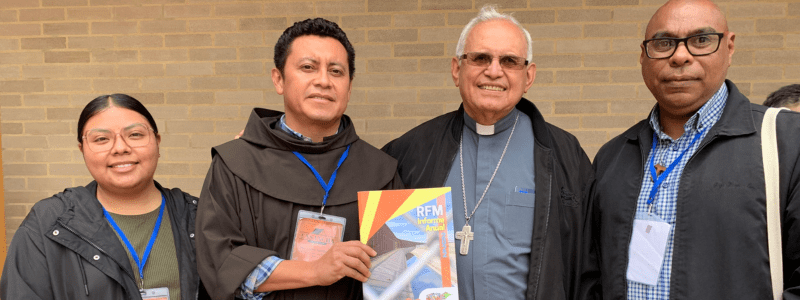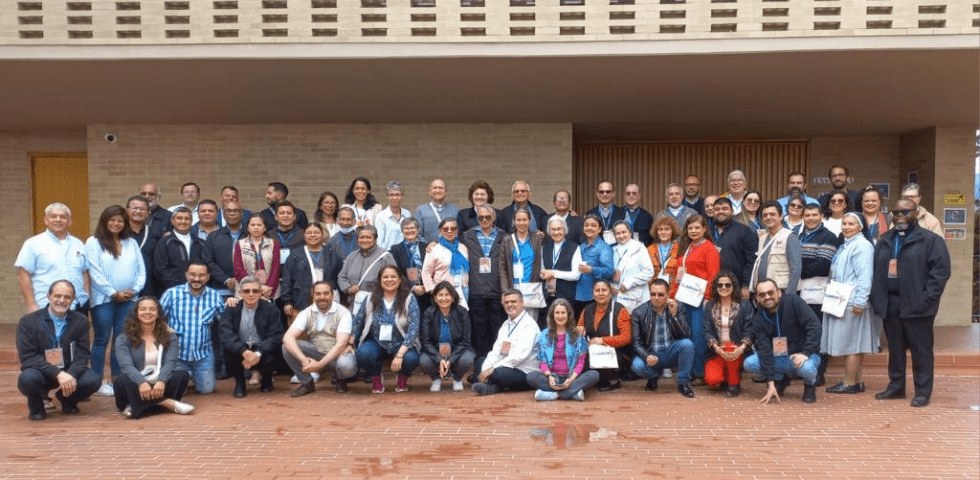Daniel Rodríguez Blanco, OFM, as Director of the General Office of Justice, Peace and Integrity of Creation and member of the Board of Directors of the Franciscan Migrant Network of the Americas (FMN), and Vianey Martínez, Executive Secretary of the FMN, participated in this Assembly.
Filled with hope and a renewed commitment to respond to the cries of migrants, displaced persons, refugees and victims of human trafficking in Latin America and the Caribbean, the 81 participants in the VI General Assembly of the Red Clamour met at the new CELAM headquarters in Bogotá from 11 to 15 September. Migrants, men and women religious, lay people, priests and bishops – who left for the 22 countries of the Americas and Europe – left the meeting convinced that the Clamor network is strengthened, with clear objectives and a deeper commitment to the service of charity and integral human development of the people who live the experience of mobility on the continent.
According to a note from the Latin American and Caribbean Ecclesial Network on Migration, Displacement, Refuge and Trafficking in Human Beings, this VI Assembly included synodal spaces for spirituality, analysis of reality, doctrinal and technical-operational formation, work and community discernment, mutual knowledge and the celebration of fraternity. All these dynamics produced fruits that show the objectives of the meeting have been achieved: the identification of priority pastoral needs and challenges, common actions to respond to these needs in each area of work, a network that evaluates itself, a renewed leadership, the inclusion of new organisations and a sense that this is the best fuel to undertake with Christian effectiveness the task that lies ahead: communion in faith, charity and the joy of the Gospel.
Trends and new developments in the reality of migration
Through a process that included the collective construction and prior reading of the document “Trends and new developments in the reality of forced migration and trafficking”, discernment through the method of conversation in the spirit in 7 groups distributed by geographical areas, and a consensus exercise in plenary, the participants identified the demands: “Make our situation visible… the reasons that forced us to leave, the difficulties along the way, the problems we face in staying and integrating, the contribution we make… Pay special attention to those we leave behind…to the missing migrants, to those who are “stuck” …., to our psychological and emotional health, to the new climatic migrations, to the migratory situation in Haiti and to the most risky passages…such as the Darien”, “Pay more attention to the victims of trafficking, denounce the crime…prevent it…and influence public policies…”, “Work together, be increasingly prophetic…alleviate the tiredness of those who welcome, protect, receive and defend us”. These are some of the key expressions of the cries identified.
Looking ahead to 2024
In order to respond to these demands in 2024, the participants divided themselves into five work areas and defined actions. Among these, the following stand out: Articulation, continuation of the mapping of services, production of a handbook for migrants’ homes and creation of spaces for the self-care of caregivers; trafficking, production of contents and materials for prevention, organisation of meetings. Training, production of a diploma course on migration and refuge, development of thematic round tables and study groups. Communication, dissemination of the mapping of services, development of campaigns against xenophobia and for the prevention of trafficking. Advocacy, participation in the World Refugee Forum as a regional co-organiser and in Cartagena +40. All these actions are included in the Network’s Annual Operational Plan 2024.

A more consolidated network
At this meeting, in addition to the renewal of some leadership, new teams were formed and organisations such as the Scalabrinian Foundation, based in Rome, and the Migrant Care Organisation of the Archdiocese of Port of Spain, in Trinidad and Tobago, were admitted to the CLAMOR network.
Several items on the agenda contributed to the network’s self-assessment for 2022-2023. Seven years after its creation, 16 national networks have been formed: Argentina, Brazil, Bolivia, Colombia, Chile, Costa Rica, Ecuador, El Salvador, Guatemala, Honduras, Mexico, Peru, Panama, Paraguay, Dominican Republic and Venezuela. In the last year, 44% have experienced a high level of consolidation, 37% a medium level and 19% a low level. The challenge of synodality continues.
More funding = more action
Despite the fact that each organisation has a lot of work and its own agenda, that it is often not easy to find space to function as a network, and that more adequate funding is needed, the five working commissions managed to carry out 72% of the actions set for the period, in addition to the timely implementation of other relevant actions in response to situations that arose.
One achievement is that the members recognise each other as companions on the journey, growing in their sense of belonging as a network and in the synodal experience of working together for those on the existential margins. Support and recognition have also grown, both from the Bishops’ Conferences and the Vatican Curia, as well as from organisations of the United Nations system, among others. The presence on the borders where we walk with the people and the ability to solve together concrete cases in favour of people in forced mobility are also very significant; a sign that the articulation on the ground is working, both within the countries and in the cross-border dimension.

